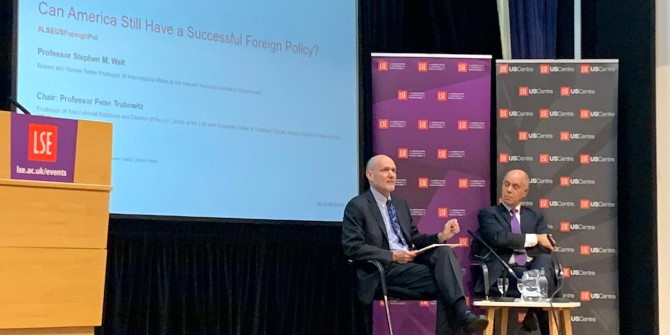 Charles Dunst reviews the recent US Centre public event ‘Can America Still Have a Successful Foreign Policy?’ with Professor Stephen M. Walt, Robert and Renée Belfer Professor of International Affairs at the Harvard Kennedy School of Government.
Charles Dunst reviews the recent US Centre public event ‘Can America Still Have a Successful Foreign Policy?’ with Professor Stephen M. Walt, Robert and Renée Belfer Professor of International Affairs at the Harvard Kennedy School of Government.
In the wake of US President Donald Trump’s chaotic removal of American forces from Syria, on 21 October Stephen M. Walt, Robert and Renée Belfer Professor of International Affairs at the Harvard Kennedy School of Government delivered a prescient lecture, chaired by US Centre Director, Professor Peter Trubowitz, explaining the roots of and offering a corrective for the US’s failed post-Cold War foreign policy.
Walt, drawing from his latest book, The Hell of Good Intentions, argued that these missteps stem from the American foreign policy elite’s belief that the US is and should remain a global goodwill liberal crusader. This conception is flawed, he argues, because it relies on an optimistic view of globalization that “did not deliver”; inflates defense spending; threatens and prompts aggression from non-democracies; and assumes the US has the ability to statebuild, which he called “positively delusional.”
Boosted by proclamations of democracy’s inevitable victory, the foreign policy elite — “the blob” — subsequently supported doomed 1990s and 2000s democratization projects in Cambodia, Somalia, Haiti, Afghanistan, and elsewhere. They sold their strategy publicly by inflating threats, falsifying benefits, hiding costs, and holding nobody accountable. The last point is key: Lacking accountability fortifies the blob as a “self-protecting world” in which Henry Kissinger, for example, can bomb neutral Cambodia, helping to instigate a genocide in and hobbling that country for decades to come, but since “nibble nori rolls and remaki at A-list parties” without consequence –– demonstrating, as Walt said, “little evidence that the foreign policy elite have learned from their mistakes.”
Walt’s critique of the blob’s lack of accountability helps to explain US foreign policy failures. Potential war criminals can contemporarily transition from public office to polite society, receiving lucrative book deals and fellowships in the process. Why would American foreign policymakers change this status quo that has served their predecessors so well?
Despite the blob’s continued push for it, Americans don’t favor expansionism, he said, citing the restrained foreign policy campaign promises of Bill Clinton, George W. Bush, Barack Obama, and Trump. And while Trump is certainly unique stylistically, foreign policy under him has remained largely status quo: NATO is intact; America’s Middle Eastern foes are the same; and Washington is still selectively critical of human rights violations abroad, admonishing foes in Beijing and Tehran but not allies in Jerusalem and Riyadh.
“It’s the worst of both worlds,” Walt said of Trump. “An over-ambitious foreign policy with an incompetent steward.” But he also added: “Liberal hegemony was doomed to fail no matter who was president.”

His alternative is “offshore balancing,” which deems a peer competitor, China, to be the US’s only genuine security threat. Walt prescribes power balancing in Asia; reducing America’s NATO commitments, allowing Europe “to handle its own defense”; lessening the US’s Middle Eastern military presence, normalizing relations with all countries in the region, rather than “unconditionally” supporting some; stepping away from regime change and state-building, focusing instead on diplomacy; and better demonstrating liberalism at home to set an example abroad. Walt suggested that to bring about such change, the foreign policy elite must be reformed, with fresh ideas entering the fray through the creation of new thinktanks.
Walt concluded by deeming the US’s good fortune –– its geographic isolation from threats, for one –– as the main factor enabling its survival despite a “cavalier approach” to foreign policy, also referencing Otto von Bismarck’s quip: “God has a special providence for fools, drunkards, and the United States of America.”
In the Q&A session, Husam Zomlot, the Head of the Palestinian Mission to the UK, asked Walt if Trump’s eventual successor would reverse certain decisions regarding Israel and Palestine. Walt was pessimistic, arguing that Trump simply “removed the hypocrisy” from US policy regarding the conflict, stripping away the illusion of American even-handedness, siding with Israel. There was “no peace process,” he said. “Trump didn’t end it.”
The event’s Q&A also covered how the US will approach Brexit (by seeking to secure the most US-beneficial trade deal); the contradictions of American exceptionalism (which informs both isolationism and crusaderism); if we were returning to a realist world (“we never left it”); and other topics, including the ripple effects of a potential American retrenchment from Europe.
- Watch the video recording for the event “Can America Still Have a Successful Foreign Policy?”.
Please read our comments policy before commenting.
Note: This article gives the views of the author, and not the position of USAPP – American Politics and Policy, nor the London School of Economics.
Shortened URL for this post: http://bit.ly/36lzCYO
About the author
 Charles Dunst – LSE International Relations
Charles Dunst – LSE International Relations
Charles Dunst is an M.Sc. candidate in the LSE Department of International Relations, and a journalist who has written for The New York Times, The Atlantic, Foreign Policy, and the Council on Foreign Relations, among other outlets. He was previously based in Cambodia. Twitter: @charlesdunst


